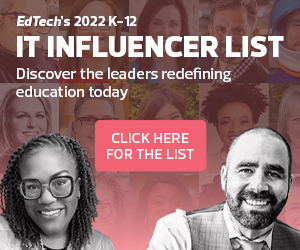EDTECH: What drew you to technology and an IT position in K–12?
HOWELL: I taught special education for three years, and I started to use technology on Fridays with my students. Writing was difficult for my students who were on an IEP, so I started to implement Google Classroom and Google Docs. My students could pick different topics, start a Google Doc and share it through Google Classroom, and then I was able to collaborate with them on that document.
Their writing improved because they had a spell-checker. Some of my students started to use dictation. That is what hooked me: I saw the confidence in my students go up. I was able to personalize the feedback.
LEARN MORE: Find tips to create a Class and navigate other features on Google Classroom.
MANAHAN: I started my career as a high school French teacher, and I got into ed tech because it was a necessity for me. Being a French teacher in the middle of cornfields, how do I bring that world to my students? We were fortunate, even back then, to live in a world where technology made that possible.
Then my superintendent came to me when our technology director left in the middle of the year, and he said, “You’re the go-to person for technology around here. I saw you put on a prom. I’m pretty sure you can handle all of the crazy that comes with this.”
TEAMANN: I was seen as a very techie administrator. I have always operated in a manner that leverages technology to accomplish my goals. I was not intimidated by technology, and I wanted to make sure that our students and our staff were prepared to handle what was thrown at them.
When I crossed paths with the newly appointed superintendent, she had an opening and asked if I would be interested. I said, “I don’t know anything about networks and switches and servers.” And she said, “If you can run a building, you can run a department.”
SCHAFFER: I had been a middle school social studies teacher, and even in that role, I had always been a leader in ed tech in my building. I was one of the few people who started and piloted Google Domains for the district. I love education and teaching overall — any subject, any grade level — and I’ve always been involved in technology. So, I dove right in as a new ed tech specialist.
EDTECH: What challenges have you faced in your K–12 IT role?
HOWELL: Where I’ve made some errors in my career: I started with the problem of education. I would send out a survey and — because my job is tech — I would ask, “Do you need help with Pear Deck?”
I quickly realized that I needed to start with, “What is the problem you’re dealing with, and what tool can we use to help you?” I’ve learned from my mistakes.
MANAHAN: My technology coordinator is a man. If we go to conferences together and meet with new vendors, they always assume he’s the director. I’ve been in some situations where certain audiences don’t take me very seriously. Usually, that’s in a one-on-one situation.
One time at a conference, I was co-facilitating a roundtable session with a man, and my questions were getting no responses. He started talking about something and all of a sudden people started participating.
DISCOVER: Attendees share their key takeaways from CoSN2022.
SCHAFFER: I have a circle of friends in this space who banded together because we were women of color, and we would go to conferences and not see many people who looked like us. We began pulling people in so that they would feel comfortable, because there’s nothing worse than going to a conference where no one looks like you and no one is talking to you.
EDTECH: Where have you found inspiration in female leadership and technology?
SCHAFFER: All the women in my circle are very much like I am — they are at the forefront in their own parts of the world. They are definitely leaders, women like Nicol Howard, Sarah-Jane Thomas, Sandra Paul, Carla Jefferson, Shauna White, and Tammy Turlington.
MANAHAN: I am very fortunate to have a great network of men and women, but I’ve also had really strong female leaders here. In Indiana, at our State Department of Education, our director was Candice Dodson. She was a great woman who was in ed tech for a long time and was really a champion for other women in the field.
HOWELL: I think we have over 3,000 members in our Gold EDU group. It was a vision I had for something small, and it just grew a lot bigger. And now that piece is able to help a lot of different educators from around the world.
TEAMANN: Wendy Eldredge, Crandall ISD’s superintendent, is fantastic, and she is not a status-quo kind of leader. Her ability to see strengths that align with the goals of the position is a huge, huge encouragement. With her help, instead of being intimidated by a skill set I didn’t have, I was able to see the skills that I did have that could transform departments.
EDTECH: What drives you to continue working in K–12 education during tumultuous times?
SCHAFFER: I love education. I love to learn, and I love being able to bring that love of learning to students and teachers and even parents.
During the pandemic, tech specialists were foremost in helping teachers make that transition to online. The majority of my teachers had already been doing all those things, so they were very comfortable.















